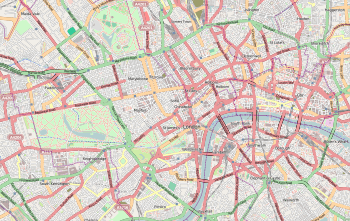St. John's Wood tube station
St. John's Wood is a London Underground station located in St John's Wood in the City of Westminster, north-west London. It was opened in 1939 as a stop on the Bakerloo line. Today St. John's Wood is served by the Jubilee line, between Swiss Cottage and Baker Street stations and is in Travelcard Zone 2.[4] A journey between St. John's Wood and Baker Street typically takes less than three minutes.[5]
| St. John's Wood | |
|---|---|
Station entrance | |
 St. John's Wood Location of St. John's Wood in Central London | |
| Location | St John's Wood |
| Local authority | City of Westminster |
| Managed by | London Underground |
| Number of platforms | 2 |
| Fare zone | 2 |
| London Underground annual entry and exit | |
| 2014 | |
| 2015 | |
| 2016 | |
| 2017 | |
| 2018 | |
| Railway companies | |
| Original company | London Passenger Transport Board |
| Key dates | |
| 20 November 1939 | Opened |
| 1 May 1979 | Bakerloo line service replaced by Jubilee line |
| Listed status | |
| Listing grade | II |
| Entry number | 1401096[3] |
| Added to list | 20 July 2011 |
| Other information | |
| External links | |
| WGS84 | 51.53472°N 0.17417°W |
Location
The station building is located on the corner of Acacia Road and Finchley Road[6] and tube maps from late 1938 and early 1939 indicate that it was originally to be given the name Acacia Road or Acacia.[7][8] This station is the nearest to Lord's Cricket Ground and Abbey Road Studios.[6] The station is therefore not to be confused with Abbey Road DLR station in east London.
History
The station was opened on 20 November 1939 on a new section of deep-level tunnel constructed between Baker Street and Finchley Road when the Metropolitan line's services on its Stanmore branch were transferred to the Bakerloo line.[9] The new station replaced two nearby stations on the Metropolitan line which had closed the previous day. These were Lord's (originally named St. John's Wood Road, then St. John's Wood and, finally, Lord's) and Marlborough Road.[9]
The station was transferred along with the rest of the Stanmore branch to the Jubilee line when it opened on 1 May 1979.[9]
The station building designed by Stanley Heaps[10] is Grade II listed.[11]
The platform design remains the same as when opened in 1939, as designed by Harold Stabler. In 2006, the tiles were cleaned up and replaced.[12]
Services
Train frequencies vary throughout the day, but generally operate every 2–5 minutes between 05:54 and 00:18 in both directions.[13][14]
Connections
London Buses routes 13, 46, 113, 187 and night route N113 stop outside the station.[15] Coach routes 712, 755, 757, 758, 768, 771, 772, 797 and A6 also serve the station. London Buses routes 139 and 189 serve Abbey Road.[15]
In popular culture
The station appeared in the music video for "Bedsitter" by Soft Cell.[5]
A common trivia question is, "Which London Underground station does not contain any of the letters in the word "mackerel"? The answer is St John's Wood, which does not contain any of the letters A-C-E-K-L-M-R. This is only true because the word "Saint" is always abbreviated "St" in the name, and because Hoxton is on the London Overground but not the Underground. Victoria Coren Mitchell described this as her favourite trivia question.[16][17][18] Two former stations also fulfil the mackerel test: Wotton and Wood Siding, which were part of the Underground network between 1933 and 1935.[19]
References
- "Multi-year station entry-and-exit figures (2007-2017)" (XLSX). London Underground station passenger usage data. Transport for London. January 2018. Retrieved 22 July 2018.
- "Station Usage Data" (CSV). Usage Statistics for London Stations, 2018. Transport for London. 21 August 2019. Retrieved 27 April 2020.
- Historic England. "St John's Wood Underground Station (1401096)". National Heritage List for England. Retrieved 6 May 2014.
- Standard Tube Map (PDF) (Map). Not to scale. Transport for London. May 2020. Archived (PDF) from the original on 7 July 2020.
- "Tube Facts & Figures". www.geofftech.co.uk.
- "Google Maps". Google Maps.
- Harris, Cyril M. (2006) [1977]. What's in a name?. Capital Transport. p. 61. ISBN 1-85414-241-0.
- Horne, Mike (2000). The Jubilee Line: An Illustrated History. Capital Transport. p. 19. ISBN 1-85414-220-8.
- Rose, Douglas (2016) [1980]. The London Underground, A Diagrammatic History (9th ed.). Douglas Rose/Capital Transport. ISBN 978-1-85414-404-1.
- Day, John R; Reed, John (2010) [1963]. The Story of London's Underground (11th ed.). Capital Transport. p. 133. ISBN 978-1-85414-341-9.
- "16 London Underground Stations Listed At Grade II". English Heritage. Retrieved 28 July 2011.
- "Station Refurbishment Summary" (PDF). London Underground Railway Society. July 2007. Retrieved 18 February 2015.
- "Jubilee line timetable: From St. John's Wood Underground Station to Swiss Cottage Underground Station". Transport for London. Retrieved 19 February 2015.
- "Jubilee line timetable: From St. John's Wood Underground Station to Baker Street Underground Station". Transport for London. Retrieved 19 February 2015.
- "Buses from St. John's Wood" (PDF). Transport for London. May 2013. Retrieved 18 February 2015.
- "Rob Eastaway". www.robeastaway.com.
- Hartston, William (10 January 2013). "Top 10 facts about the Tube". Express.co.uk.
- Hardman, Caroline (20 April 2011). "Who Does That: What's with all the mackerel?".
- "Metropolitan - from Quainton Road to Brill". Underground History.
External links
| Wikimedia Commons has media related to St. John's Wood tube station. |
| Preceding station | Following station | |||
|---|---|---|---|---|
towards Stanmore | Jubilee line | towards Stratford |
||
| Former services | ||||
towards Stanmore | Bakerloo line Stanmore branch (1939–1979) | towards Elephant & Castle |
||